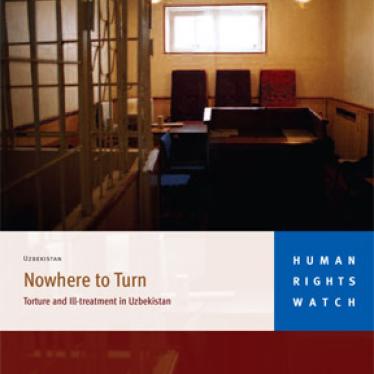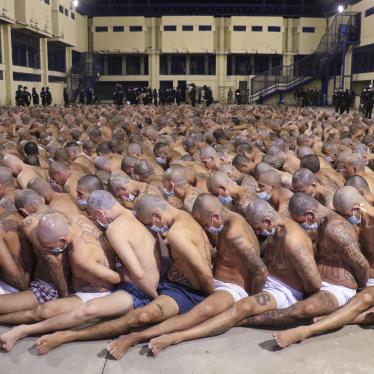(Astana) - US Secretary of State Hillary Clinton should use her impending visits to Kyrgyzstan and Uzbekistan to promote concrete human rights improvements, Human Rights Watch said today.
In Kyrgyzstan she should call for a thorough and impartial investigation into the violence in April and June 2010, fair trials for defendants in cases resulting from the violence, and improved security around the court hearings, Human Rights Watch said. In Uzbekistan she should call on the government to free wrongfully imprisoned human rights defenders and journalists and to end repression of civil society, Human Rights Watch said.
"Clinton should be clear with Kyrgyzstan's new leadership that the only way it can achieve real justice for this year's violent events is by protecting human rights," said Rachel Denber, acting Europe and Central Asia director at Human Rights Watch. "With a new government in place, there is no excuse to postpone this any longer."
Clinton is scheduled to meet with President Roza Otunbaeva of Kyrgyzstan on December 2 and is later expected to meet with President Islam Karimov while in Uzbekistan. Clinton's visit to Kyrgyzstan coincides with the confirmation of a coalition government after months of instability and violence.
Unrest surrounding the ouster of the former Kyrgyz president, Kurmanbek Bakiyev, in early April led to 85 deaths, hundreds of injured, and continuing violence. Between June 10 and 14, ethnic violence shook southern Kyrgyzstan, killing hundreds, injuring thousands, destroying more than 2,600 homes, and resulting in the temporary mass exodus to Uzbekistan of nearly 100,000 ethnic Uzbeks from the country's southern provinces.
The government's investigation into the violence has been marred by serious violations. Arbitrary arrests and extortion have been widespread, and there is credible evidence that many detainees have been subjected to ill-treatment, including torture. The authorities have systematically denied defendants due process rights, such as the right to a lawyer of their choice.
In a letter to the new Kyrgyz government, Human Rights Watch described problems plaguing numerous trials related to the June violence. Aggrieved relatives of ethnic Kyrgyz victims have attacked ethnic Uzbek defendants and their relatives and lawyers, and journalists before, during, and after trial hearings. Security for defense lawyers has been so poor that they threatened to boycott the trials. Although the situation improved after an international outcry in October, more violent attacks and threats took place in November. The Human Rights Watch letter outlined specific steps the government should take to address these issues.
"Clinton should urge the new government to fully respect human rights while restoring law and order," Denber said. "Security incidents in Osh and Bishkek earlier this week are a worrying sign that Kyrgyzstan's leadership is still facing tremendous challenges."
On November 29, a gunfight broke out between security forces and alleged militants in the center of Osh, as a result of which five people were killed and several security officers were injured. On November 30, a bomb exploded in Bishkek outside the site of a trial of former government officials accused of the April killings. As a result, the trial was postponed.
Clinton's visit to Uzbekistan will come at the end of a three-day trip to Central Asia.
"Clinton's meeting with Karimov is a chance for the US to set the record straight on the need to respect rights," Denber said. "Urging the Uzbek government to release imprisoned human rights defenders is a good place to start."
Human Rights Watch said that Clinton's statement in Astana on November 30 that, "No country can be fully free unless human rights defenders are given their rights," sent an important signal about the weight the US administration attaches to this issue. Human Rights Watch called on her to bring this message to Uzbekistan, where at least 14 human rights defenders languish in Uzbekistan's notoriously abusive prison system for no reason other than their legitimate human rights work. Several are in very poor health. The 14 imprisoned defenders are: Solijon Abdurakhmanov, Azam Formonov, Nosim Isakov, Gaibullo Jalilov, Alisher Karamatov, Jamshid Karimov, Norboi Kholjigitov, Rasul Khudainasarov, Ganihon Mamatkhanov, Farkhat Mukhtarov, Habibulla Okpulatov, Yuldash Rasulov, Dilmurod Saidov, and Akzam Turgunov.
Other civic activists are also serving sentences on politically motivated charges, such as Yusuf Jumaev, a poet and political dissident who called for President Karimov's resignation before the country's presidential elections in December 2007.
Although the US maintains a congressionally-mandated visa ban against Uzbek officials linked to serious human rights abuses, it uses routes through Uzbekistan as part of the Northern Distribution Network to supply forces in Afghanistan. US military contracts with Uzbeks as part of this supply chain are potentially as lucrative for persons close to the Uzbek government as direct US aid would be. Despite the State Department's re-designation of Uzbekistan in January 2009 as a "Country of Particular Concern" for systematic violations of religious freedom, the US government retains a waiver on the sanctions outlined in the designation, raising serious concerns that the US is sending a mixed message on the importance of human rights improvements in Uzbekistan.
"Uzbekistan's importance as a strategic partner should not lessen the US government's willingness to be outspoken about the lack of meaningful progress by Tashkent on longstanding human rights concerns," Denber said. "Clinton needs to underscore that human rights don't take a back seat to strategic interests but are a core component of the US-Uzbekistan relationship."
Uzbek authorities have a long record of restricting independent civil society activism and freedom of expression, and obstructing human rights work in the country. In the last six months alone, at least two journalists and one human rights defender have been convicted on politically motivated charges, including a Voice of America correspondent, Abdumalik Boboev, who in October was convicted and fined by a court on criminal defamation and other charges. Another Tashkent-based activist, Tatyana Dovlatova, is on trial on politically motivated charges of hooliganism.
For more than a decade the authorities have maintained a systematic campaign of religious persecution of Muslims and other religious believers who practice their faith outside state controls or who belong to unregistered religious organizations. More than one hundred people have been arrested on religious extremism charges so far in 2010 alone.
Human Rights Watch and other groups have extensively documented a pattern of convictions in religious extremism cases based solely on confessions, which in many cases are alleged to have been extracted through torture or ill-treatment. Families of persons imprisoned on religious extremism charges report that their relatives have been subjected to cruel, inhuman, and degrading treatment in prison.
Human Rights Watch also called on Clinton to urge the Uzbek government to allow the unimpeded operation of nongovernmental organizations, both domestic and international; issue invitations to the eight UN special rapporteurs who have requested access; guarantee freedom of speech and of the media; and implement the conventions against child labor, including by allowing the International Labor Organization to conduct independent monitoring during harvest season.







